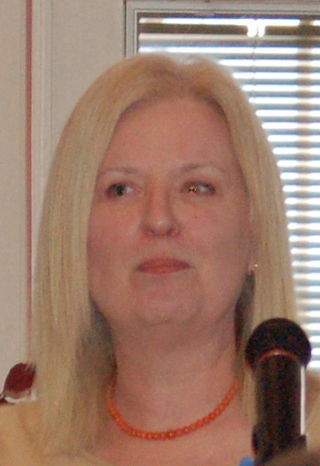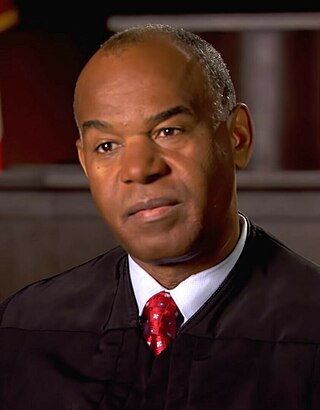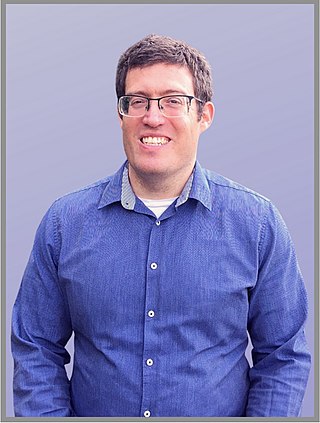
Loyola University Chicago School of Law is the law school of Loyola University Chicago, in Illinois. Established in 1909, by the Society of Jesus, the Roman Catholic order of the Jesuits, the School of Law is located in downtown Chicago. Loyola University Chicago School of Law offers degrees and combined degree programs, including the Doctor of Juridical Science (S.J.D.).
In law, a per curiamdecision or opinion is one that is not authored by or attributed to a specific judge, but rather to the entire court or panel of judges who heard the case. The term per curiam is Latin for "by the court".
Reva B. Siegel is the Nicholas deB. Katzenbach Professor of Law at Yale Law School. Siegel's writing draws on legal history to explore questions of law and inequality, and to analyze how courts interact with representative government and popular movements in interpreting the Constitution. She is currently writing on the role of social movement conflict in guiding constitutional change, addressing this question in recent articles on reproductive rights, originalism and the Second Amendment, the "de facto ERA," and the enforcement of Brown. Her publications include Processes of Constitutional Decisionmaking ; The Constitution in 2020 ; and Directions in Sexual Harassment Law. Professor Siegel received her B.A., M.Phil, and J.D. from Yale University, clerked for Judge Spottswood William Robinson III on the D.C. Circuit, and began teaching at the University of California at Berkeley. She is a member of the American Academy of Arts and Sciences, and is active in the American Society for Legal History, the Association of American Law Schools, the American Constitution Society, in the national organization and as faculty advisor of Yale's chapter. She was elected to the American Philosophical Society in 2018.

Thomas Eugene Baker is a constitutional law scholar, Professor of Law, and founding member of the Florida International University College of Law. With four decades of teaching experience, Baker has authored eighteen books, including two leading casebooks, has published more than 200 scholarly articles in leading law journals, and has received numerous teaching awards.

Ann Althouse is an American law professor and blogger.

Patrick Errol Higginbotham is an American judge and lawyer who serves as a Senior United States circuit judge of the United States Court of Appeals for the Fifth Circuit.
Barry R. Schaller (1938–2017) was an associate justice of the Connecticut Supreme Court from 2007 to 2008. He served as a judge of the Connecticut Appellate Court from 1992 to 2007. Before that, he was a trial court judge in Connecticut for 18 years. A graduate of Yale University and the Yale Law School, he was a visiting lecturer in public policy at Trinity College where he taught bioethics, public health law and ethics, health policy, and public policy and law. He was a clinical visiting lecturer at the Yale Law School, where he taught appellate practice and procedure. He also had appointments as visiting lecturer at Wesleyan University, where he taught bioethics and public health law, ethics and policy, and at the University of Connecticut School of Public Health. Justice Schaller also taught an appellate advocacy class at Yale Law School, focusing on Connecticut appellate procedure. Justice Schaller was a former chair of the Connecticut Board of Pardons, a charter life member of the Connecticut Bar Foundation, a member of the American Law Institute, and Chair of the Connecticut Judicial Ethics Advisory Committee. In May, 2008, he was awarded an honorary Doctor of Laws degree by Quinnipiac University School of Law.

Diane Pamela Wood is an American attorney who serves as the director of the American Law Institute, a senior circuit judge of the United States Court of Appeals for the Seventh Circuit, and a senior lecturer at the University of Chicago Law School.
Non-publication of legal opinions is the practice of a court issuing unpublished opinions. An unpublished opinion is a decision of a court that is not available for citation as precedent because the court deems the case to have insufficient precedential value.

Roger Lee Gregory is an American lawyer who serves as a United States circuit judge of the United States Court of Appeals for the Fourth Circuit.
The Fordham International Law Journal is a student-run law journal associated with the Fordham University School of Law. According to the Washington and Lee journal rankings, it is the 4th most cited student-edited international and comparative law journal in the United States. The current editor-in-chief is Samantha Ragonesi.
John V. Orth is an American legal scholar and author. He is the William Rand Kenan Jr. Professor of Law at the University of North Carolina School of Law.

Laurie Lou Levenson is a professor of law, William M. Rains Fellow, the David W. Burcham Chair in Ethical Advocacy, and Director of the Center for Legal Advocacy at Loyola Law School of Loyola Marymount University in Los Angeles. She teaches evidence, criminal law, criminal procedure, ethics, anti-terrorism, and white collar crime. She served as Loyola's Associate Dean for Academic Affairs from 1996 to 1999. In addition to her teaching responsibilities, she is the Director of the Loyola Center for Ethical Advocacy. She received the 2003 Professor of the Year awards from both Loyola Law School and the Federal Judicial Center.

Harry Thomas Edwards is an American jurist. He served as a United States circuit judge of the United States Court of Appeals for the District of Columbia Circuit from 1980 to 2005, taking senior status in 2005, and a professor of law at the New York University School of Law.
Trying cases in the court of public opinion refers to using the media to influence public support for one side or the other in a court case. This can result in persons outside the justice system taking action for or against a party. For instance, the reputation of a party may be greatly damaged even if they win the case. Lawyer Robert S. Bennett noted that when he represents high-profile clients, he sometimes finds them in a (figurative) Bermuda triangle of cross-currents generated by a criminal investigation, the news media, and the U.S. Congress. It has been noted that there is no Fifth Amendment right against self-incrimination in the court of public opinion.

Charles Sumner Lobingier was an American jurist who served as a judge of the Philippine Court of First Instance from 1904 to 1914 and as Judge of the United States Court for China in Shanghai from 1914 to 1924. He was also the author of a number of books on international and comparative law.
In law, an appeal is the process in which cases are reviewed by a higher authority, where parties request a formal change to an official decision. Appeals function both as a process for error correction as well as a process of clarifying and interpreting law. Although appellate courts have existed for thousands of years, common law countries did not incorporate an affirmative right to appeal into their jurisprudence until the 19th century.

Penelope (Penny) Andrews is a South African and American legal scholar.

Shai Dothan is a lawyer and legal academic. He is currently Associate Professor of International and Public Law at the University of Copenhagen Faculty of Law affiliated with iCourts—Centre of Excellence for International Courts (2014-present). He lives close to Copenhagen with his wife and two children.










